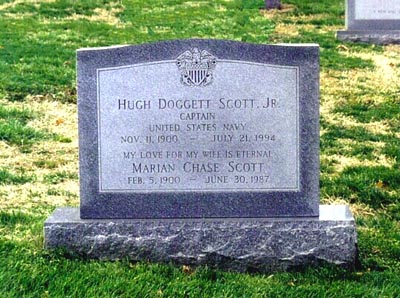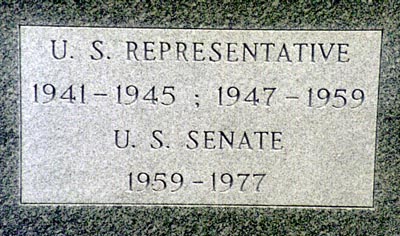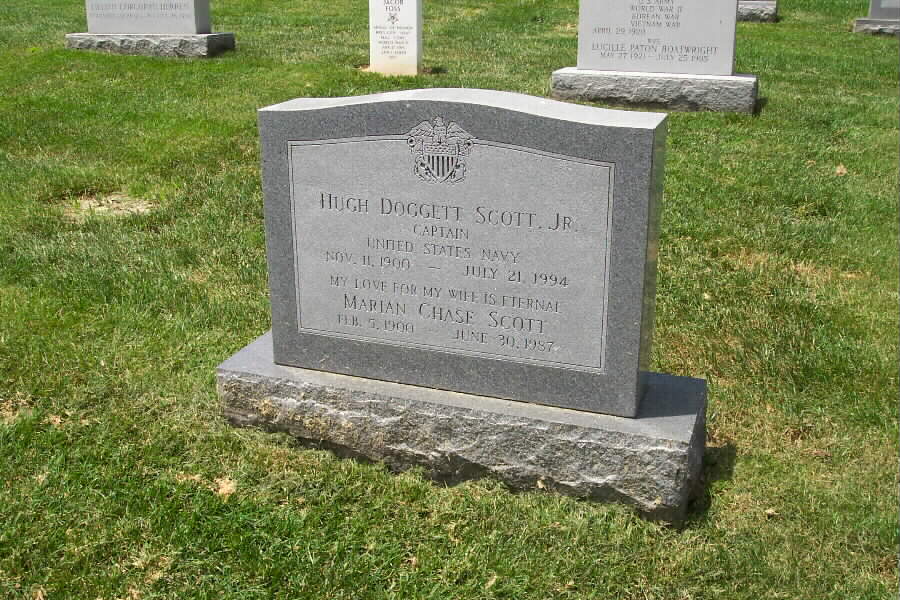From a contemporary news report:
Hugh Scott, who served as Republican leader in the Senate during the Watergate years, has died at 93. He had represented Pennsylvania in Congress, as a House member and senator, for 36 years.
Sen. Scott died Thursday (July 21, 1994) of cardiac arrest in a retirement home in Falls Church, a Washington suburb.
“He died peacefully in his sleep,” said his longtime secretary, Janet Horgan.
Mike Mansfield, the former senator from Montana, said, “What a good man he was and what a fine person he was to work with.” Mansfield was the Democratic majority leader of the Senate while Scott led the minority.
Sen. Bob Dole, who holds the minority leader’s job now, said: “Few Americans gave more of themselves to public service than Hugh Scott. . . . Here was a man who gave his all to ensure that our republic remain strong and free.”
Sen. Scott was elected to the House of Representatives in 1940 and to the Senate in 1958. He served three Senate terms. His tenure as minority leader began in 1969 when Richard Nixon became president.
Nixon resigned in 1974; Sen. Scott remained in the Senate until his retirement in 1977.
Sen. Scott said in December 1973 that Nixon would not get out of the Watergate “mess” unless he fulfilled a promise to disclose all records and tape recordings related to the scandal.
On Aug. 7, 1974, Sen. Scott, Sen. Barry Goldwater of Arizona and House Minority Leader John Rhodes went to the White House to tell Nixon his position was hopeless – that perhaps only four senators would vote against convicting him. Two days later, Nixon resigned.
The son of a banker, Sen. Scott was born in Fredericksburg, Va., on Nov. 11, 1900. He was a graduate of Randolph-Macon College and the University of Virginia Law School. He served in the Navy in World War II.
In 1926, four years after completing law school, he was appointed assistant district attorney in Philadelphia. He held the post until he was elected to the U.S. House from there in 1941.
He served two terms, was unseated, and came back two years later to regain his old job. In all, he served eight terms in the House.
Sen. Scott was elected to the Senate in 1958 and re-elected in 1964 and 1970 by increasing majorities.
He announced he would not run for re-election in 1976 under the cloud of a Senate investigation into allegations he had received illegal cash contributions from Gulf Oil Co.
His wife, Marian, died in 1987 at age 87. They had one daughter.
A memorial service is scheduled for Thursday at Fort Myer in Arlington, Va. He will be buried with full military honors at Arlington National Cemetery.
Saturday, July 23, 1994
HUGH SCOTT; LED GOP IN SENATE UNDER NIXON
FALLS CHURCH, VA.
Hugh Scott, who served as Republican leader in the Senate during the Watergate years, has died at 93. He had represented Pennsylvania in Congress, as a House member and senator, for 36 years.
Senator Scott died Thursday (July 21, 1994) of cardiac arrest in a retirement home in Falls Church, a Washington suburb.
“He died peacefully in his sleep,” said his longtime secretary, Janet Horgan.
Mike Mansfield, the former senator from Montana, said, “What a good man he was and what a fine person he was to work with.” Mansfield was the Democratic majority leader of the Senate while Scott led the minority.
Senator Bob Dole, who holds the minority leader’s job now, said: “Few Americans gave more of themselves to public service than Hugh Scott. . . . Here was a man who gave his all to ensure that our republic remain strong and free.”
Senator Scott was elected to the House of Representatives in 1940 and to the Senate in 1958. He served three Senate terms. His tenure as minority leader began in 1969 when Richard Nixon became president.
Nixon resigned in 1974; Senator Scott remained in the Senate until his retirement in 1977.
Senator Scott said in December 1973 that Nixon would not get out of the Watergate “mess” unless he fulfilled a promise to disclose all records and tape recordings related to the scandal.
On August 7, 1974, Senator Scott, Senator Barry Goldwater of Arizona and House Minority Leader John Rhodes went to the White House to tell Nixon his position was hopeless – that perhaps only four senators would vote against convicting him. Two days later, Nixon resigned.
The son of a banker, Senator Scott was born in Fredericksburg, Va., on November11, 1900. He was a graduate of Randolph-Macon College and the University of Virginia Law School. He served in the Navy in World War II.
In 1926, four years after completing law school, he was appointed assistant district attorney in Philadelphia. He held the post until he was elected to the U.S. House from there in 1941.
He served two terms, was unseated, and came back two years later to regain his old job. In all, he served eight terms in the House.
Senator Scott was elected to the Senate in 1958 and re-elected in 1964 and 1970 by increasing majorities.
He announced he would not run for re-election in 1976 under the cloud of a Senate investigation into allegations he had received illegal cash contributions from Gulf Oil Co.
His wife, Marian, died in 1987 at age 87. They had one daughter.
A memorial service is scheduled for Thursday at Fort Myer in Arlington, Virginia. He will be buried with full military honors at Arlington National
Cemetery.
Courtesy of the Congress of the United States:
SCOTT, Hugh Doggett, Jr., a Representative and a Senator from Pennsylvania; born in Fredericksburg, Spotsylvania County, Va., on November 11, 1900; attended public and private schools; graduated, Randolph-Macon College, Ashland, Va., 1919 and the law department of the University of Virginia at Charlottesville 1922; was admitted to the bar in 1922 and commenced practice in Philadelphia, Pa.; during the First World War enrolled in the Student Reserve Offices’ Training Corps and the Students’ Army Training Corps; assistant district attorney of Philadelphia, Pa., 1926-1941; member of the Governor’s Commission on Reform of the Magistrates System 1938-1940; during the Second World War was on active duty for two years with the United States Navy with final rank of commander; author; vice president of the United States Delegation to the Interparlimentary Union; elected as a Republican to the Seventy-seventh Congress; reelected to the Seventy-eighth Congress (January 3, 1941-January 3, 1945); unsuccessful candidate for reelection in 1944 to the Seventy-ninth Congress; resumed the practice of law; chairman of the Republican National Committee 1948-1949; elected to the Eightieth Congress; reelected to the five succeeding Congresses (January 3, 1947-January 3, 1959); was not a candidate for reelection but was elected in 1958 to the United States Senate; reelected in 1964 and again in 1970, and served from January 3, 1959, to January 3, 1977; was not a candidate for reelection in 1976; Republican whip 1969; minority leader 1969-1977; chairman, Select Committee on Secret and Confidential Documents (Ninety-second Congress); lawyer; was a resident of Washington, D.C., and later, Falls Church, Va., until his death there on July 21, 1994.


Michael Robert Patterson was born in Arlington and is the son of a former officer of the US Army. So it was no wonder that sooner or later his interests drew him to American history and especially to American military history. Many of his articles can be found on renowned portals like the New York Times, Washingtonpost or Wikipedia.
Reviewed by: Michael Howard

